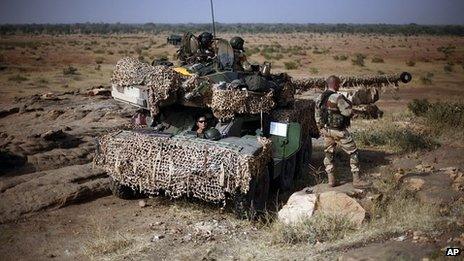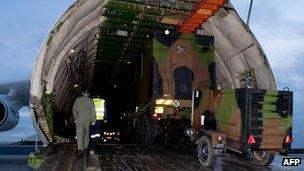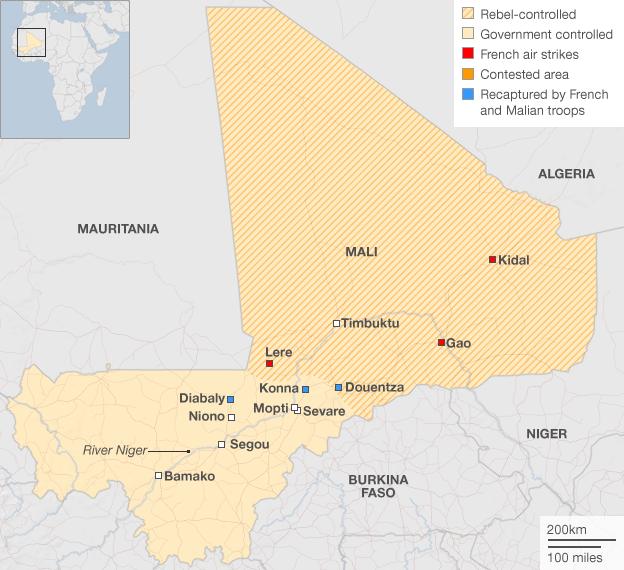Mali crisis: US admits mistakes in training local troops
- Published

French forces are leading the offensive against Islamist rebels in Mali
The US military commander in Africa says the Pentagon made mistakes in its training of Malian troops now trying to oust Islamist rebels from the north.
Gen Carter Ham of United States Africa Command (Africom) said its forces had failed to train Malian troops on "values, ethics and a military ethos".
Militant groups took advantage of an army coup last year to extend their control over a vast area of the Sahara.
Meanwhile, air strikes have been reported near the northern city of Gao.
The militant stronghold came under fire as the military operation entered its third week.
Islamist fighters seized the north of Mali last year and have imposed a strict interpretation of Sharia, or Islamic law, on its inhabitants.
France intervened militarily on 11 January to stop them advancing further south.
'Military ethos'
However, human rights groups have since accused Malian troops of killing Arabs and ethnic Tuaregs as they advance north.
The claims caused alarm in the West, particularly in the US, which has been training troops in Mali and neighbouring countries to tackle the militant threat for several years.
Gen Ham said Malian troops were given plenty of tactical training, but not enough ethics training.
"We were focusing our training almost exclusively on tactical or technical matters," he told a forum at Washington's Howard University on Thursday.
Gen Carter Ham: "We didn't spend probably the requisite time focusing on values, ethics and a military ethos"
"We didn't spend probably the requisite time focusing on values, ethics and a military ethos."
The general said not enough was done to convince Malian recruits that "when you put on the uniform of your nation, you accept the responsibility to defend and protect that nation, to abide by the legitimate civilian authority that has been established, to conduct yourselves according to the rule of law".
"We didn't do that to the degree that we needed to," he added
Mali's army staged a coup in March 2012.
In the chaos which followed, Islamist militants and secular rebels extended their control of the whole of the north - an area of the Sahara Desert larger than France - while the army hardly put up any resistance.
Islamist bases targeted
Meanwhile, French TV has been carrying grainy images of air strikes which the military said was near the city of Gao.
Malian and Niger security sources also reported the strikes, saying two Islamist bases with fuel stocks and weapon dumps near Gao had been destroyed.

More French troops and equipment are being flown out to Mali
French and Malian troops also staged joint patrols for the first time, in the town of Douentza west of Gao, the AFP news agency said, quoting Malian sources.
The BBC's Mark Doyle in Mali says a big international troop build-up is continuing ahead of a probable French-led air and ground offensive against Gao and other desert cities.
There are currently about 2,000 French troops in Mali.
An armed column of Chadian soldiers is making its way to Mali overland and more than 1,000 Nigerian soldiers are expected there too.
AFP is also reporting that Islamist groups have blown up the strategic Tassiga bridge over the River Niger, near the border with Niger and on the road to Gao.
"No-one can pass to Niger or come to Gao," transport business owner Abdou Maiga told the agency.
The UN refugee agency says more than 7,000 civilians have fled to neighbouring countries since 10 January to escape the fighting.
In another development, Egypt's President Mohammed Morsi has unveiled a proposal for a peaceful resolution to the Mali conflict.
The five-point plan includes political negotiations, economic and development initiatives and co-ordinated relief efforts. President Morsi has spoken against military intervention in Mali.
